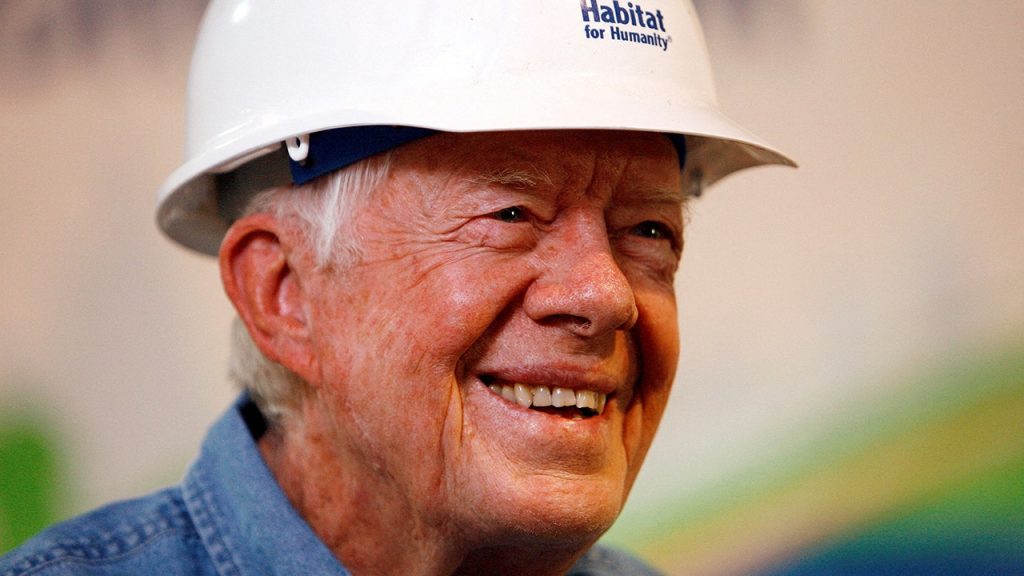Jimmy Carter, the 39th President of the United States, left an indelible mark on the world, not only through his presidency but also through his tireless dedication to humanitarian work. While his single term in office might be viewed with mixed opinions, his post-presidency endeavors earned him widespread admiration and respect, solidifying his legacy as a champion of peace, human rights, and global health. His frequent appearances on Gallup’s “Most Admired Man” list, ranking third overall behind only Billy Graham and Ronald Reagan, underscore the public’s recognition of his character and contributions. This consistent presence on the list, spanning from 1946 to 2020 with 29 appearances, reflects his enduring impact on the American consciousness.
Carter’s presidency, though lasting only one term, laid the groundwork for his later humanitarian pursuits. A Gallup poll conducted in June 2023 revealed a 57% retrospective approval rating for his time in office, placing him in the bottom half of presidential rankings but still ahead of Nixon and Trump. This mixed reception reflects the complexities of his presidency, marked by both challenges and achievements. However, it was his post-presidency work that truly defined his legacy, earning him the Nobel Peace Prize in 2002 and cementing his reputation as a global advocate for peace and human rights. This award recognized his “decades of untiring effort to find peaceful solutions to international conflicts, to advance democracy and human rights, and to promote economic and social development.” While President George W. Bush was preparing for war in Iraq in the fall of 2002, Carter was actively pursuing peace negotiations, advocating for human rights, and working to improve social welfare around the world.
The Nobel committee highlighted Carter’s crucial role in mediating the 1978 peace agreement between Egypt and Israel, a feat they believed warranted the prize much earlier. His continued dedication to peace and mediation, often diverging from official US policy, demonstrated his unwavering commitment to global harmony. Carter’s willingness to challenge established norms and pursue peaceful solutions, even when unpopular, further solidified his image as a principled and independent voice on the world stage. This independent streak, coupled with his deep-seated moral compass, allowed him to pursue a path of peace and reconciliation, even when it placed him at odds with prevailing political sentiments.
The Carter Center, established in 1982 with his wife Rosalynn, became a powerful instrument for promoting democracy and improving global health. Its pioneering work in election observation, monitoring over 113 elections across Africa, Latin America, and Asia since 1989, has contributed significantly to ensuring fair and transparent electoral processes in developing nations. This commitment to democratic principles resonated globally, promoting accountability and good governance in regions often plagued by political instability. The Center’s work also extended to public health initiatives, most notably the campaign against Guinea worm disease. Their efforts resulted in a dramatic reduction in cases, from millions to just 14 in 2021, showcasing the impact of sustained public health interventions.
Beyond the quantifiable achievements of the Carter Center, Carter’s personal qualities also contributed to his enduring legacy. His unwavering integrity, humility, and devotion to humanity resonated with people across the political spectrum. Even those who disagreed with his political stances acknowledged his sincere commitment to making the world a better place. This widespread respect was evident in the accolades he received from various figures, including Reagan biographer and historian Craig Shirley, who hailed Carter as “one of the best ex-presidents of the 20th century.” Shirley emphasized Carter’s contributions through the Carter Center, his prolific writing, and his charitable works, painting a picture of a man deeply committed to service.
In总结, Jimmy Carter’s life transcended the boundaries of his presidency. While his time in office may be subject to varying interpretations, his post-presidency work firmly established him as a global icon of peace and humanitarianism. His unwavering commitment to human rights, his tireless efforts to resolve conflicts, and his dedication to improving global health earned him widespread admiration and respect. His legacy, cemented by the Nobel Peace Prize and the enduring work of the Carter Center, serves as a testament to the power of individual action to create a more just and compassionate world. From mediating international disputes to combating debilitating diseases, Carter’s efforts touched countless lives and left an indelible mark on the global landscape. His story continues to inspire, reminding us that true leadership lies not just in holding positions of power, but in using one’s influence to uplift others and strive for a better future.

